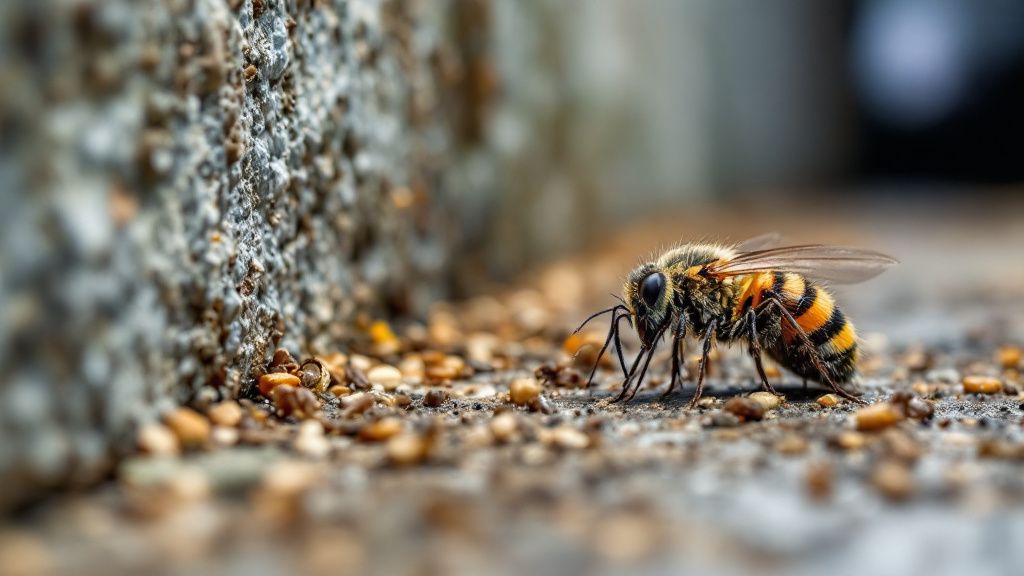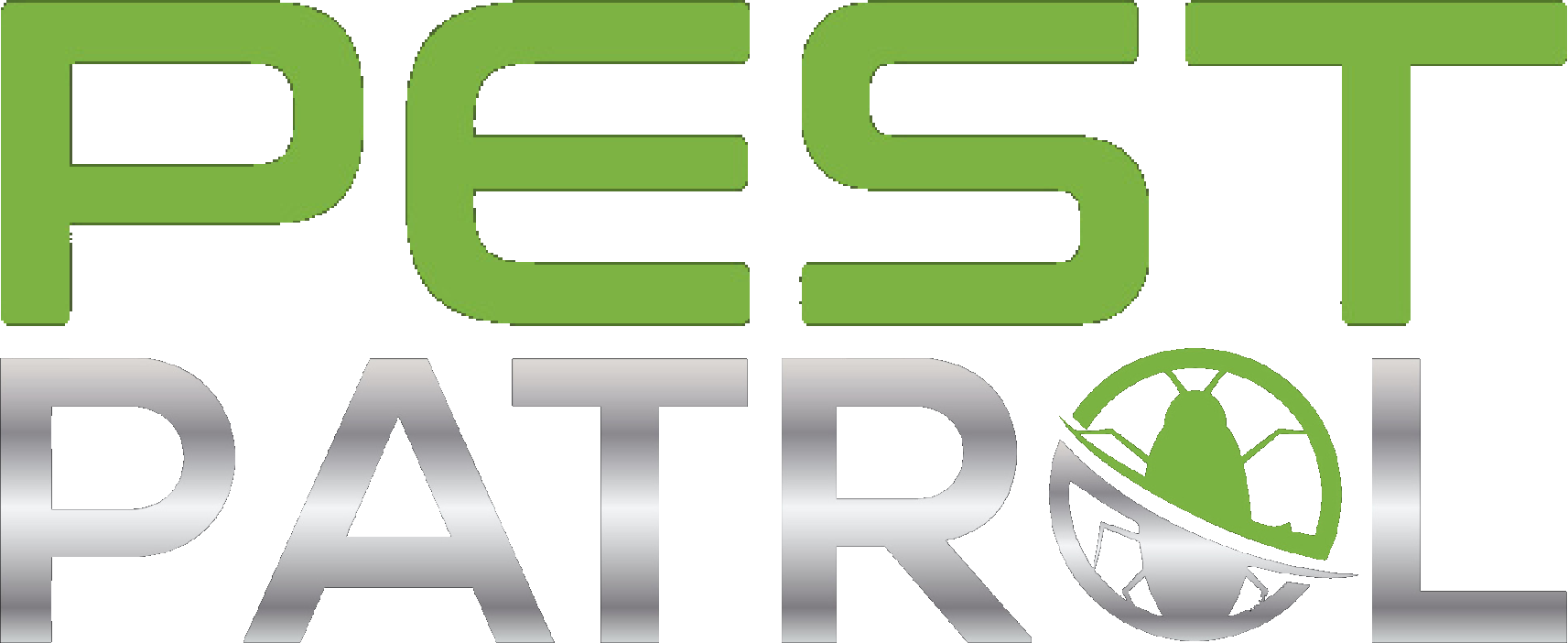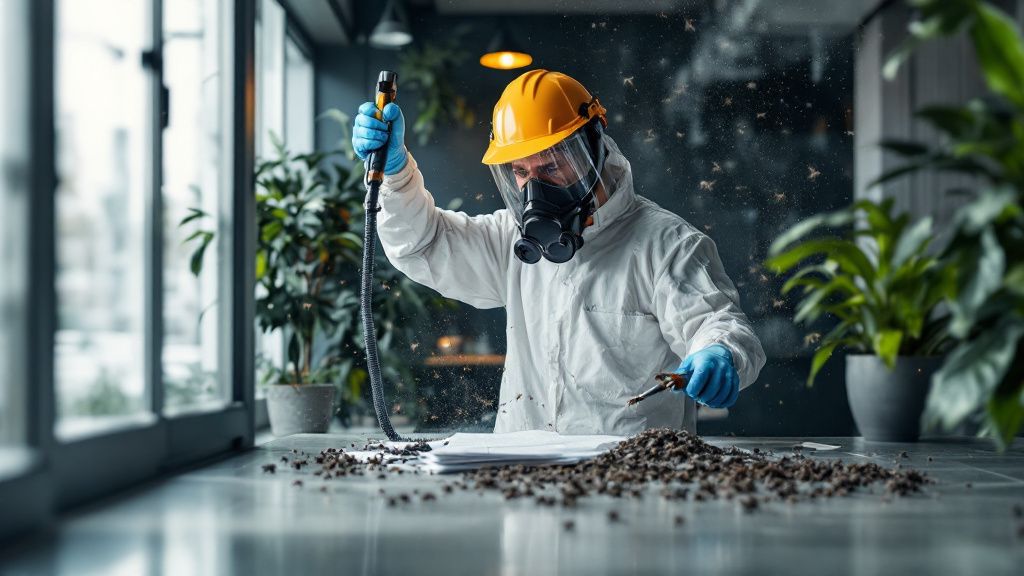In the realm of commercial pest control, mastering effective techniques is crucial for maintaining a pest-free business environment. You need to understand the intricacies of pest management, which involves identifying pest threats and implementing strategic pest control solutions. By engaging in regular pest control inspections, you can prevent infestations before they spiral out of control. Employ local pest control experts to tailor solutions specific to the needs of your business, ensuring both affordability and effectiveness. With their guidance, adopting proactive measures and pest control tips becomes easier, potentially lowering the overall commercial pest control cost. Whether dealing with emergencies or routine inspections, integrating comprehensive commercial pest control services into your operations ensures the longevity and success of your business.

Identifying Common Commercial Pests
Recognizing the most prevalent commercial pests is essential for effective pest management. Common nuisances include rodents like rats and mice, which thrive in food storage areas, posing significant health risks. Cockroaches, another ubiquitous threat, are often found in kitchens and bathrooms, spreading harmful bacteria. Similarly, termites can undermine structural integrity, causing extensive damage and escalating commercial pest control costs.
Ants are typically drawn to sugary food sources, and can infiltrate a workplace swiftly, while flies are also troublesome, attracted to waste and unsanitary conditions. Identifying these pests early allows you to engage affordable pest control services before infestations become critical. Regular pest control inspections are key to maintaining a safe and healthy business environment.
Enlisting local pest control experts gives you access to tailored pest control solutions. With their expertise, you can implement specific strategies that prevent these common pests from becoming a larger issue. Emergency pest control can also be readily available when required, ensuring rapid response to unexpected incursions.
In the coming years, commercial pest control solutions will likely evolve to become more integrated with sustainable practices, aiming for reduced environmental impact. This shift will demand advanced knowledge and strategies, compelling businesses to adapt swiftly to emerging pest management trends.

Impacts of Pests on Business Operations
Pests can significantly disrupt business operations by damaging property, contaminating products, and causing health concerns among staff and customers. Infestations may lead to costly repairs, harming your reputation and affecting customer trust. Rodent infestations can damage electrical wiring, causing potential safety hazards and operational downtime. Regular pest control inspections can help detect issues early and mitigate these risks efficiently.
From a financial perspective, pests can increase commercial pest control costs and lead to substantial losses due to spoilage or contamination of stock. Restaurants and food-related businesses are particularly vulnerable, where a single cockroach sighting might warrant emergency pest control, tarnishing your establishment’s image. Embracing affordable pest control services helps keep these unpredictable expenses in check.
Think of pests as a silent, invisible force slowly eroding your business’s foundation. Much like a leaking roof, the damage might not be immediately visible but is insidious and costly over time. Utilizing tailored pest control solutions, crafted by local pest control experts, allows you to proactively address issues, ensuring minimal impact on daily operations.
Being proactive not only safeguards your business environment but also ensures compliance with health regulations. Incorporating expert pest management into your business plan can help maintain a positive and healthy workplace, fostering productivity and customer satisfaction. Using targeted pest control tips from experts provides peace of mind and operational continuity.

Steps to Prevent Pest Infestations
Preventing pest infestations begins with maintaining a clean and well-organized environment. Regularly cleaning areas such as kitchens and storage spaces discourages pests by eliminating food sources. Proper waste management and sealing potential entry points are essential strategies within effective pest management practices, helping to deter unwanted cre |atures from infiltrating your space.
Routine pest control inspections play a vital role in early detection and prevention. These inspections, ideally conducted by local pest control experts, identify potential problem areas before an infestation takes root. Consistent monitoring allows you to apply targeted pest control solutions, making your prevention strategy more robust and reliable.
To make the most of pest control solutions, try implementing a schedule for maintenance tasks like checking for leaks and repairing structural damage promptly. This proactive approach serves to strengthen your defenses, reducing the likelihood of pests taking hold. Prompt action can avoid the need for more costly emergency pest control interventions, keeping the commercial pest control cost manageable.
Engaging affordable pest control services ensures you consistently apply effective measures tailored to your specific needs. These services offer expert pest control tips, guiding you in fortifying your business against potential threats, thereby promoting a safer and more secure commercial establishment. Adopting these practices shields your business operations from disruptions, maintaining seamless functionality.

Integrated Pest Management in Commercial Settings
Integrated Pest Management (IPM) is a strategic approach that combines different methodologies to effectively manage pest populations in commercial settings. One of the challenges in pest management is the over-reliance on chemicals, which can lead to resistance and environmental harm. This issue can be addressed through the integration of biological, mechanical, and cultural controls into an IPM framework. By doing so, you can minimize the need for chemical interventions, thus reducing the long-term commercial pest control cost and mitigating environmental risks.
Implementing IPM involves regular pest control inspections to accurately identify pest types and understand their behavior. By collaborating with local pest control experts, you can devise customized pest control solutions that target specific challenges unique to your business environment. Affordable pest control measures, such as habitat modification and exclusion techniques, enhance the effectiveness of your IPM program while maintaining a commitment to sustainable practices.
Education plays a significant role in the success of an IPM program. Equipping your team with pest control tips and knowledge ensures they become active participants in preventing infestations. By fostering awareness and promoting proactive habits, businesses can fortify their defenses against pests. This strategy not only limits the need for emergency pest control but also supports a smarter, more eco-friendly approach to commercial pest management.

Environmental Considerations in Pest Control
Considering the environment is crucial in today’s pest control landscape. With a growing focus on sustainable practices, businesses are seeking pest management strategies that minimize ecological impact while effectively managing infestations. By opting for eco-friendly pest control solutions, you can contribute to environmental preservation without sacrificing efficiency or safety in your operations.
Using environmentally responsible pest control methods, such as natural predators or organic treatments, lessens the chemical burden on your surroundings. Did you know that about 70% of commercial establishments are now integrating these natural solutions into their pest management plans? This shift highlights an industry-wide commitment to sustainability and encourages further innovation in eco-conscious practices.
Regularly scheduled pest control inspections and prevention strategies help you apply environmentally sensitive techniques, reducing the need for reactive measures that may harm the ecosystem. Engaging local pest control experts equipped with sustainability-focused pest control tips ensures the success of your green initiatives while remaining cost-effective.
Balancing effective pest control with environmental stewardship involves ongoing adaptation and education. By embracing affordable pest control options geared towards conservation, you maintain a healthy, pest-free business setting and align with global efforts to protect natural resources. This commitment not only enhances your brand’s reputation but supports the broader community in preserving the environment for future generations.

Training Employees to Handle Pest Issues
Training employees to effectively manage pest issues is a key component of an integrated pest management strategy. By equipping your team with knowledge about common pests and identifying early signs of infestations, you empower them to act swiftly and mitigate potential disruptions. Regular training also emphasizes the importance of maintaining cleanliness, proper storage, and waste management, which are critical in preventing pest issues from escalating.
Comparing employee-led pest intervention versus relying solely on external commercial pest control services highlights the benefits of a hybrid approach. While professional services provide expert solutions and emergency pest control options, having trained staff ensures a rapid response in-house, reducing the likelihood of minor issues developing into major infestations. This dual strategy can also control commercial pest control costs by preventing the need for frequent professional interventions.
Incorporating pest control tips into regular staff meetings and providing access to local pest control experts for guidance ensures continuous education and engagement. Employee vigilance complements professional pest management efforts, creating a robust and comprehensive defense against pest infestations. By fostering a proactive culture within your organization, you enhance overall business operations and instill confidence in your workforce’s ability to maintain a pest-free environment.


